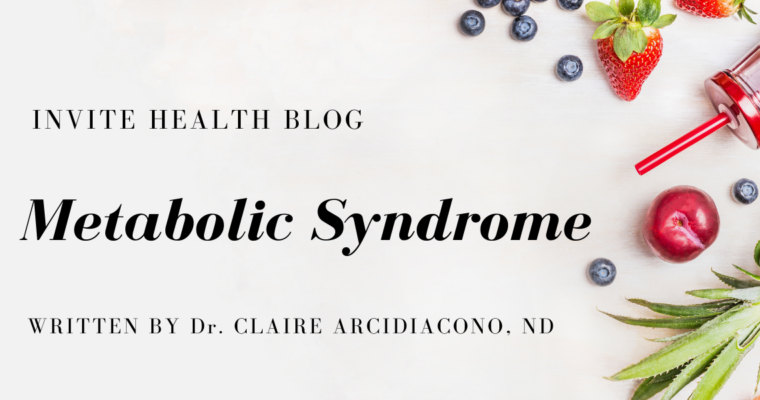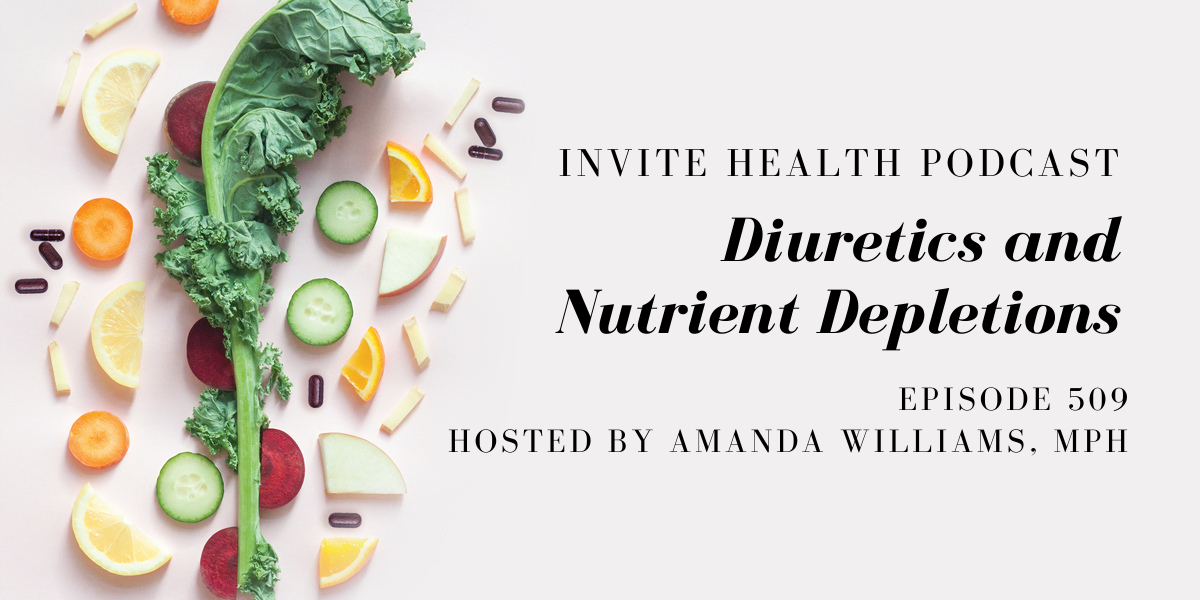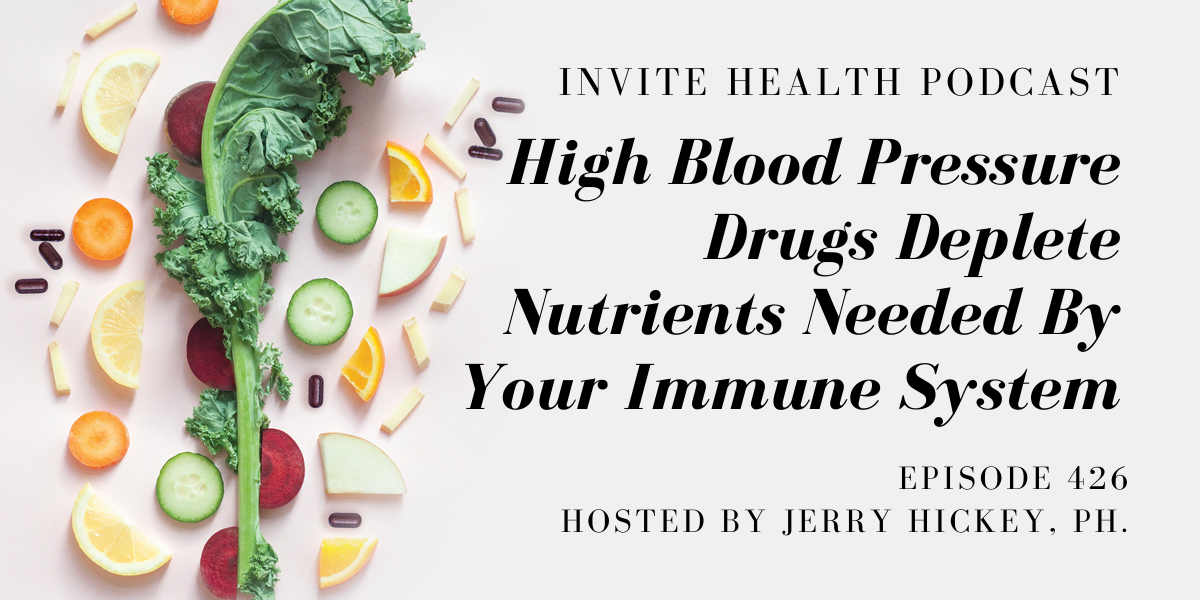diuretics
Subscribe Today!
Please see below for a complete transcript of this episode.
Diuretics and Nutrient Depletions – InViteⓇ Health Podcast, Episode 509
Hosted by Amanda Williams, MPH
*Intro music*
InVite Health Podcast Intro: Welcome to the InViteⓇ Health Podcast, where our degreed healthcare professionals are excited to offer you the most important health and wellness information you need to make informed choices about your health. You can learn more about the products discussed in each of these episodes and all that InViteⓇ Health has to offer at www.invitehealth.com/podcast. First time customers can use promo code PODCAST at checkout for an additional 15% off your first purchase. Let’s get started!
*Intro music*
Amanda Williams, MPH:
[00:00:40] Let me continue on my journey of drug-induced nutrient depletion when it comes to cardiac medications. The most commonly-prescribed medications oftentimes create significant nutrient depletion, so I’m going to go over a few more. I did a podcast on beta blocking drugs. Now, today I’m going to talk about diuretics. These are many times combined with other hypertensive drugs, so you’ll see a combination of maybe a beta blocker with hydrochlorothiazide. So I want to talk about the diuretics and how many nutrients have a potential of becoming depleted and that is a big problem. We certainly know that to be the case. I’m Amanda Williams, MD, MPH, and let’s get right to it.† [00:01:26]
[00:01:26] Let’s jump into the class of antihypertensive medications classically known as the diuretics. We have loop diuretics. We have thiazide diuretics. You have your potassium-sparing diuretics. But we know one thing about these diuretics, whether you’re taking hydrochlorothiazide, you’re on Lasix, furosemide. We know that these in particular are definitely a risk factor for creating significant nutrient depletions when we look at things like calcium, magnesium, zinc, folate. Why are these a problem? Well, let’s just break that down. Say you’re on a medication for your high blood pressure and it is stripping the body of zinc. What is that doing to the health of your immune system? Yes, we know the importance of zinc when it comes to immune defenses. We know the importance of zinc when it comes to the thyroid function. Let’s think about magnesium. This is always the classic one that I go to whenever I’m talking about drug-induced nutrient depletions and cardiac drugs.† [00:02:33]
[00:02:34] OK, let’s think of the nonsensical way that this works. You’re on a medication because you have high blood pressure, so we already have to clue in to the fact the body naturally is probably lacking magnesium. Because remember, one of the roles of magnesium of its many roles in the body is to create vasodilation. It does this through the relaxation of the smooth muscles of your arteries. So if we have a lack of magnesium, what that in turn can do is create vessel constriction. If we have vasoconstriction, we’re going to elevate our blood pressure. So we get into the trap of being on a medication to lower your blood pressure. And that same medication is lowering your body’s ability to hold on to magnesium, so it’s actually removing magnesium. So at the end of the day, what’s occurring is your blood pressure medication can at the same time, be raising your blood pressure because it’s stripping you of magnesium. So if someone is on a diuretic in particular, you really have to be cognizant of this and you have to make sure that you are at minimum, taking a multivitamin.† [00:03:50]
MAGNESIUM: THE HEART OF HEALTH – INVITE HEALTH PODCAST, EPISODE 420. Listen Now>>
[00:03:52] Now, when we look at things like hydrochlorothiazide, we know this is like the top 10 of commonly-prescribed medications. We know that many people are taking these medications on a regular basis, and most people are not taking, in addition to that hydrochlorothiazide, they’re not taking magnesium, which means you’re not helping your condition of hypertension. So this is a huge, huge problem. And I’ve talked to so many folks who have been on high blood pressure medications for many years, and they’ve never linked the two together. They’ve never realized that the reason why they’re struggling with having stable blood pressure readings is because maybe the medication that they’re on to control the blood pressure is actually removing key nutrients. And so we see this with furosemide, which is known as Lasix. We definitely see this with hydrochlorothiazide. So if this is the case, we’re stripping out magnesium. We are still not resolving the problem.† [00:05:03]
[00:05:04] And let’s just say we’re removing calcium. Now what are we doing now? We are potentially creating a problem with the rhythm of the heart, we’re creating a problem with weakening of the bones. We can certainly, you know, lump in our calcium, magnesium, potassium, all of those and the inadequate access at that cellular level to those key nutrients, those key minerals. We can look at muscle pain, we can look at problems with sleep. We can look at problems with muscle cramps. So we definitely know that these medications in particular, are known to drive this. We can also see, as I talked about with beta blockers and coenzyme Q10, we know that the hydrochlorothiazide can lower your CoQ10 level as well, which once again, now we’re dealing with a problem with decrease in cellular energy production. So we think about the rhythm of the heart. We think about the functionality of the heart, how reliant those are on the energy production that occurs within the cardiac myocytes. And if our medication is stripping us of that, then this becomes a significant problem.† [00:06:16]

[00:06:17] Now let’s just go back and let’s look at other areas that can get thrown into the mix when we’re dealing with these diuretic medications that can lower your zinc. This can potentially slow your wound healing down. Now there’s oftentimes a comorbid condition of type two diabetes that goes along with hypertension. So many diabetics are on their medication for diabetes, but they’re also on high blood pressure medication. Well, what’s one thing that we definitely know about diabetics is that they are slower to heal from any type of a wound. So say they even just get a scratch on the surface of the skin. If you are lacking zinc because your diuretic medication is stripping the body of its ability to properly heal itself because you now have deficient or insufficient zinc, this can certainly be a problem. So we look at a decrease in immune function. We’re looking at issues with poor concentration, we’re looking at issues with muscle weakness. All of these can be coming as a side effect to the medication that you’re on to regulate your blood pressure. So we can see these things clearly. We know that arrhythmias, for example, are quite common in people who are taking these diuretics. And we think about the electrical conduction system of the heart and how reliant that is on things like magnesium and potassium. And so if we’re creating this imbalance of these minerals because of the medication, then as I said, at minimum, we want to be including in to our daily routine things such as a multivitamin, just a bare minimum, cover those bases.† [00:08:04]
HOW MULTIVITAMINS CAN SUPPORT IMMUNITY – INVITE HEALTH PODCAST, EPISODE 217. Listen Now>>
[00:08:05] Now we can also look at other cardiac medications, the calcium channel blockers, for example, and we know that those too can disrupt the proper absorption of things like folic acid and zinc once again, so we can look at the slow wound healing. We can look at issues when it comes to elevated homocysteine. So if you already have someone who is dealing with high blood pressure, the last thing we need is vascular inflammation on top of that. So if the medication is creating a imbalance of adequate B-vitamin absorption, now we are adding insult to injury by creating vascular inflammation with elevated homocysteine levels.† [00:08:47]
[00:08:48] So there are so many different medications that are out there that are so commonly prescribed that we know create these nutrient depletion, which is why the more you know about medications that you’re put on and the potential nutrient depletions that can occur, the better off you are. So whether we’re looking at ACE inhibitor drugs like lisinopril, I had mentioned this in the beta blocker podcast how if someone’s on an ACE inhibitor, oftentimes they’ll get a dry cat cough, I always describe it as, but it’s a dry, nonproductive cough. And the reason why this is is because of where in the body the ACE inhibitors are actually working. They’re working through an enzymatic pathway in the lung. And so long-term use of ACE inhibitor drugs and those always end in “pril,” “pril” like lisinopril… Long-term use of those are usually always associated with someone developing that type of a dry cough. And for some people, they can get this after, you know, being on a ACE inhibitor drug for one week. But once again, these are areas that you just need to be aware of and you need to take appropriate steps when it comes to your supplementation routine to make sure that you are doing the right things. Now those are just cardiac drugs that we know all of these things. When we get into things like birth control, hormone replacement, acid reflux medications, antibiotics, we really start to get that ball rolling with nutrient depletion. So I’m going to do more podcasts on the impact of drug-induced nutrient depletion. Today, I wanted to zero in predominantly on those diuretic drugs because I do think that that’s a common, very common area that people overlook when you see how widely prescribed these drugs are and just how likely it is for those nutrients to get kind of wiped out and the harmful impact that that can make in the body over the course of time when you’re on one of those medications. So if you’re on one, you definitely want to make sure that at bare minimum, you are on a comprehensive multivitamin, multimineral formulations such as the Core Multivitamin would be an excellent choice for you.† [00:11:14]
[00:11:15] So that’s all that I have for you for today. Thank you so much for tuning in to the InViteⓇ Health podcast. Remember, you can find all of our episodes for free wherever you listen to podcasts or by visiting invitehealth.com/podcast. Make sure that you subscribe. Leave us a review. You can follow us on Facebook, Twitter and Instagram, and we will see you next time for another episode of the InViteⓇ Health podcast.† [00:11:15]













